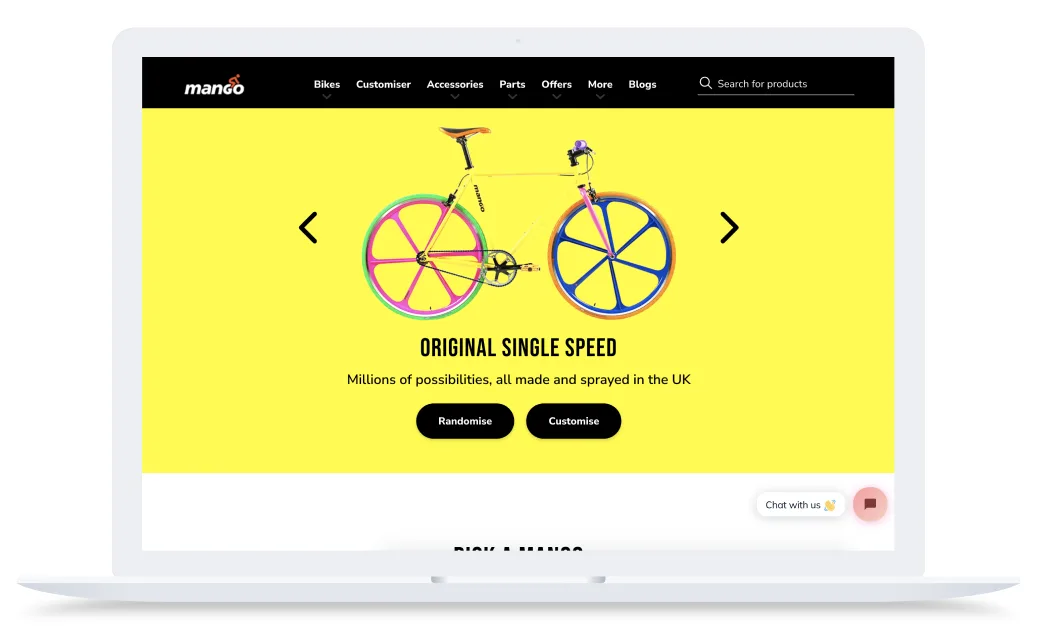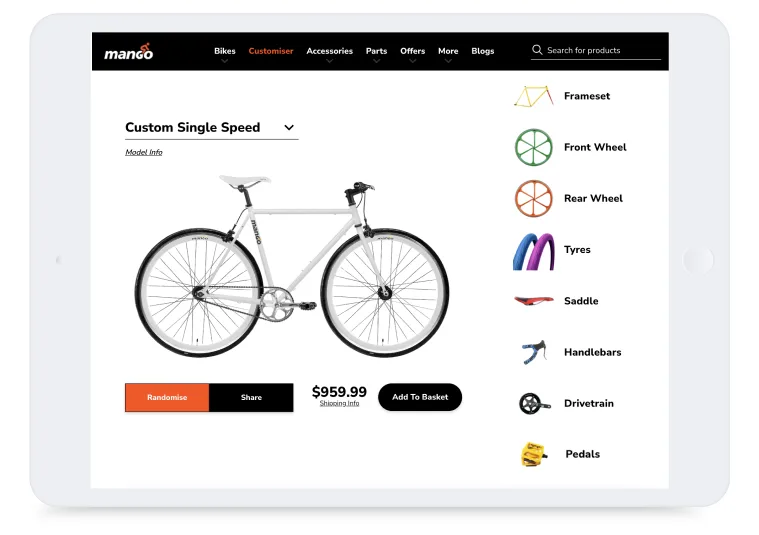BigCommerce Sweetens Mango Bikes Ecommerce Ride
Discover how customizable, cost-effective and reliable BigCommerce is and why we built it that way.

70%
increase in conversion rate
46%
increase in average order value
36%
increase in revenue
Performance metrics compare September 2021 to April 2021.
An unexpected journey
Andrew Hassard did not intend to buy a company that was in administration, but there he was at the end of 2017 doing just that. Proving truth is stranger than fiction, Andrew bought the company, Mango Bikes, relocated it from Cirencester, England to Ballyclare, Northern Ireland and relaunched the business on January 1, 2018.
“I guess I didn't really mean to buy Mango Bikes. It's what I tell everyone, and it's true. I reviewed the books and what I saw was a brand and a business. The cost base was a little bit too high, but the brand was still in okay shape,” said Owner and Managing Director of Mango Bikes Andrew Hassard. “The brand was good. It was fun and exciting, and I thought I could do something with it.”
Andrew and his team hit the reset button and stripped the business of as much cost as possible to make it as lean as possible to see if it could really work. If it did, then plans for the future would be made. Approximately six months into operating the business Andrew saw that it, in fact, could work. By 2019, the team was moving bikes out of its range and adding new ones to it. Then came the year that changed everything — 2020.
The plan for 2020 was to give Mango Bikes a bit of a push, stick the brand’s head above the clouds to see what would happen. Well, a pandemic happened and it changed Mango's strategic plan just a bit. “Things got crazy for us. The entire bike industry just went bonkers, but in a good way. We discovered we didn't need to push as much as we originally thought. As things turned out, 2020 proved to be a good year for the biking industry,” Hassard said.
Challenge
Hitting the wall
That good year also exposed the limitations of Mango Bikes’ server-based ecommerce platform. It became apparent to Andrew and team that their once reliable headless website built on WooCommerce was becoming less dependable, and increasingly inefficient.
The bike company struggled with site stability and performance issues that included mobile functionality. At this point the team realized its current ecommerce platform would not be suitable for the plans it had for the future.
Customization on WooCommerce wasn’t so simple. The customizer tool, built directly into the site’s theme, was difficult to update and often forced the Mango Bikes’ team to go through a massive process of testing to figure out what theme updates made the customizer stop working.
“It wasn't easy to work with and it wasn't flexible. There were about 60 plugins going into it. We knew why some of them were there, but not others. And when we turned them off, it was like half the site would disappear,” Hassard said. “Attempts to hack our site increased and things became increasingly difficult to keep the site secure.”
Saying good-bye to its server-based website was saying good-bye to what Andrew described as a patch here and a plugin there type of existence. “You either don’t have enough capacity or you have too much and are paying for something you’re not using. It all became overly complicated and got to the point where we just wanted to start fresh with a clean system,” Hassard said.
“Usability, performance and security were items high on our list of priorities for a new platform. And we wanted something we could use on a day-to-day basis without a continual need for developer intervention,” Hassard said.
With those priorities in mind, Mango Bikes decided it would build its new store using a cloud-based solution. “A cloud-based platform would help us manage increased traffic demands and deliver a better customized experience that would help us delight and entertain site visitors from around the world,” Hassard stated.
“Usability, performance and security were items high on our list of priorities for a new platform. And we wanted something we could use on a day-to-day basis without a continual need for developer intervention.”
Andrew Hassard Owner and Managing Director, Mango Bikes
Solution
Releasing the brakes and gaining momentum with BigCommerce
In addition to BigCommerce Mango Bikes vetted Shopify, GoDaddy, Magento, WooCommerce and Craft. Andrew found some to be too expensive while others were unable to cope with, or allow access to build, a customizer. And after all that vetting the company selected Craft to be its new ecommerce platform. But, of course, that’s not the end of the story.
“Into the site build we discovered we should have gone with BigCommerce from the start as we realized the platform would give us the flexibility we wanted and access to the code to customize as we liked. It was something we weren’t getting with Craft,” Hassard said.
Mango Bikes again changed course and in April 2021 officially launched on BigCommerce.
“With BigCommerce we were able to build a reliable site that gave us more capacity when we needed it and less when we didn't. We’re not checking every 15 minutes to see if the website is working. We just have confidence that the site is up, running, it’s secure and performing” Hassard stated.
Agencies Mellor & Smith and the RANDEM Group played key roles in Mango Bikes’ global aspirations. Mellor & Smith understood the brand so well that its designs for the front end put, what Andrew called, rocket fuel underneath it to make the company stand out. The RANDEM Group took those designs and used its technical expertise to bring them to life, including Mango Bikes’ bespoke customizer app.
“Buying a bike should be a fun process. One of the best things is choosing colors and styles. Most bike brands decide for you. Not Mango Bikes! Ninety percent of our bikes are customized purchases. At our core is customization and we constantly look for ways to offer more choices, styles and options, while making it easy for anyone to shop and understand what they are doing” said Hassard.
At the time of this writing, the various bike customization options are estimated to be well over six million combinations. No two bikes are exactly alike. And bike mechanics and assemblers state there are no two work days exactly the same either.
Highlighted Applications:
Channel Cloud Marketing: Codisto
Email Marketing: Klaviyo
Marketing Analytics: Glew
Customer Reviews: Stamped.io
Technical Features:
Customer Relationship Management (CRM):
Apps to keep things rolling
Mango Bikes turned to the BigCommerce apps marketplace to find just the right tools to extend its website’s capabilities. The brand selected Codisto to streamline its channel marketing activities and Google Sales & Orders to transfer its catalog data into the Google Merchant Center, making it easier to manage and present inventory to shoppers.
“Using Klaviyo makes it a lot simpler to be more personalized in our email marketing. It allows us to interact with customers in a fun and well-timed way with relevant content,” Hassard said. “We also use Glew, a comprehensive reporting tool that gives us a clear and unbiased assessment of everything on our site such as sales, marketing, traffic and customer data.”
“With BigCommerce we were able to build a reliable site that gave us more capacity when we needed it and less when we didn't. We’re not checking every 15 minutes to see if the website is working. We just have confidence that the site is up, running, it’s secure and performing.”
ANDREW HASSARD OWNER AND MANAGING DIRECTOR, MANGO BIKES

Results
Getting out in front
With BigCommerce as its foundation, Mango Bikes now has a website that delivers on the look, feel and customer interaction the brand wanted to be known for. “We’re now taking the company into new markets, regions and channels without adding very much, if any, workload or hassle to the team,” Hassard said. “When it comes to usability, BigCommerce is a breeze to work with. Processing orders, adding new products and integrating with the other tech we use is not difficult at all.”
Mango Bikes’ previous platform required a lot of manual tasks and system checking, but on BigCommerce, Andrew states, “With BigCommerce there's none of that. I’m not worrying about the site's performance, the customizer going down or problems with checkout. All these things, you just forget about them. And then it's the proactive, and the value added stuff that you focus on.”
Those value added activities resulted in Mango Bikes experiencing a 70% increase in its conversion rate, a 46% increase in average order value and a 36% increase in revenue when comparing September 2021’s performance to April’s performance for the same year.
“When it comes to usability, BigCommerce is a breeze to work with. Processing orders, adding new products and integrating with the other tech we use is not difficult at all.”
ANDREW HASSARD OWNER AND MANAGING DIRECTOR, MANGO BIKES
Looking Ahead
Getting your game in gear
Mango Bikes will continue to take advantage of the BigCommerce University live and on-demand training to build its business and make it more successful in the future. “BigCommerce’s training is really good. It's designed for people who use the website on a daily basis and it doesn’t get bogged down in technical speak. We get exactly what we need to run our business strategically and efficiently,” Hassard stated.
Currently, the core market for Mango Bikes is Britain. However, over the last couple of years, the company has moved into other European regions such as Germany and Scandinavia. It also has a presence in the United States. And the brand is keen on moving into Australia and Japan in the future. “As we grow and put more requirements on how we interact in each of the regions, BigCommerce will be that solid foundation we need to build it all,” Hassard said. “From where I stand, BigCommerce is an innovative, globally trusted ecommerce platform that is and will play a major role in taking our brand global.”
“From where I stand, BigCommerce is an innovative, globally trusted ecommerce platform that is and will play a major role in taking our brand global.”
ANDREW HASSARD OWNER AND MANAGING DIRECTOR, MANGO BIKES
Published: December 2021
See More On These Topics


